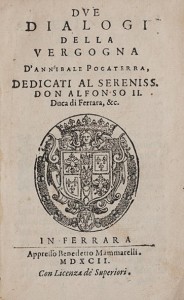Posted March 6th, 2015 at 10:50 pmNo Comments Yet

Gesualdo rarely worked with the lyrics of well known poets. One who wrote a poem set in the Third book of madrigals (1595) was Annibale Pocaterra (1559-1593), a doctor at the University of Ferrara.
Pocaterra’s father attended the famous Este court, where Gesualdo met and married his second wife, Leonora d’Este, and found much inspiration in the work of other composers. Pocaterra’s poems were also set by Luzzaschi and Fontanelli but his most famous work was his Due dialogi della vergogna (1592), a discussion of shame.

A study of this dialogue and its historical context makes interesting reading. Though its views on women are very much of their siecle (does anyone float face up when drowned?), other insights hold true: “In the end, honor and infamy belong to those who are responsible for them”.
Pocaterra’s contribution to Gesualdo’s third book (and to Betrayal) is ‘Dolcissimo sospiro’, which ends with a Heine-like twist that casts shame on the object of the author’s heart’s desire for running off with someone else:
Dolcissimo sospiro che esci da quella bocca
ove d’Amor ogni dolcezza fiocca,
deh, vieni a raddolcire
l’amaro mio dolore:
ecco ch’io t’apro il core.
Ma, folle, a chi ridico il mio martire?
Ad un sospir errante
che forse vola in seno ad altro amante?
Sweetest of sighs,
breathed from that mouth
upon which Love showers every sweetness,
ah, come and sweeten
the bitterness of my pain:
behold, I open my heart to you.
Â
Yet, fool that I am, to whom do I speak of my torment?
To an errant sigh
flying perhaps to the breast of another lover?
Capable of restraint when required, Gesualdo does not leap on this twist and express it with a portentous chromatic shift, but rather lets the realization dawn slowly. He can’t resist his own shameless little joke, however, in only very narrowly avoiding consecutive fifths (forbidden in Renaissance compositional theory) on arriving at the word “errante”.